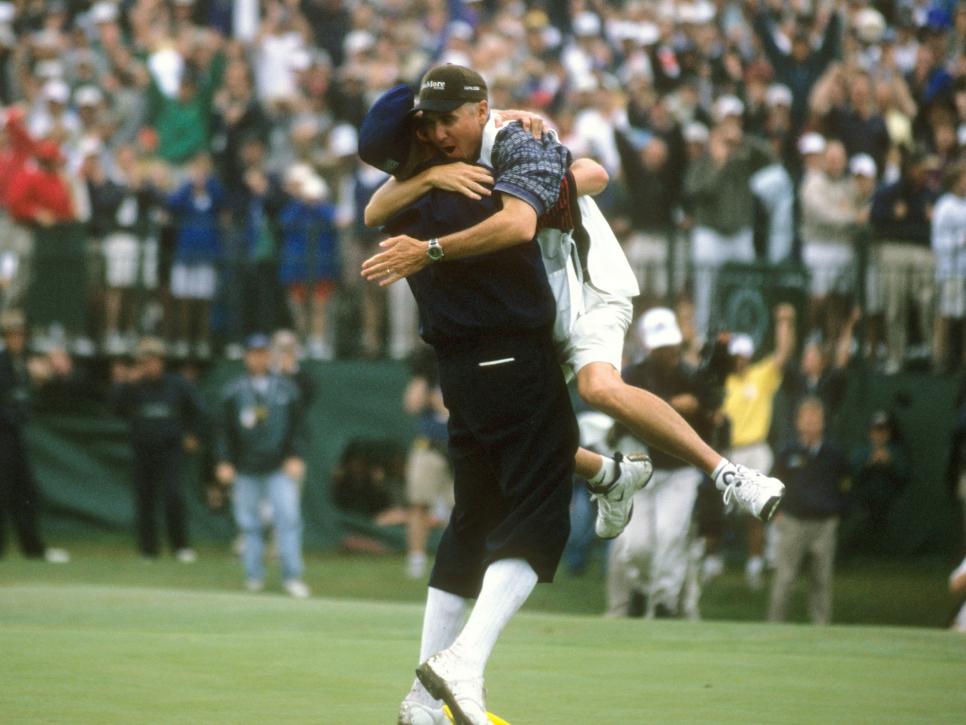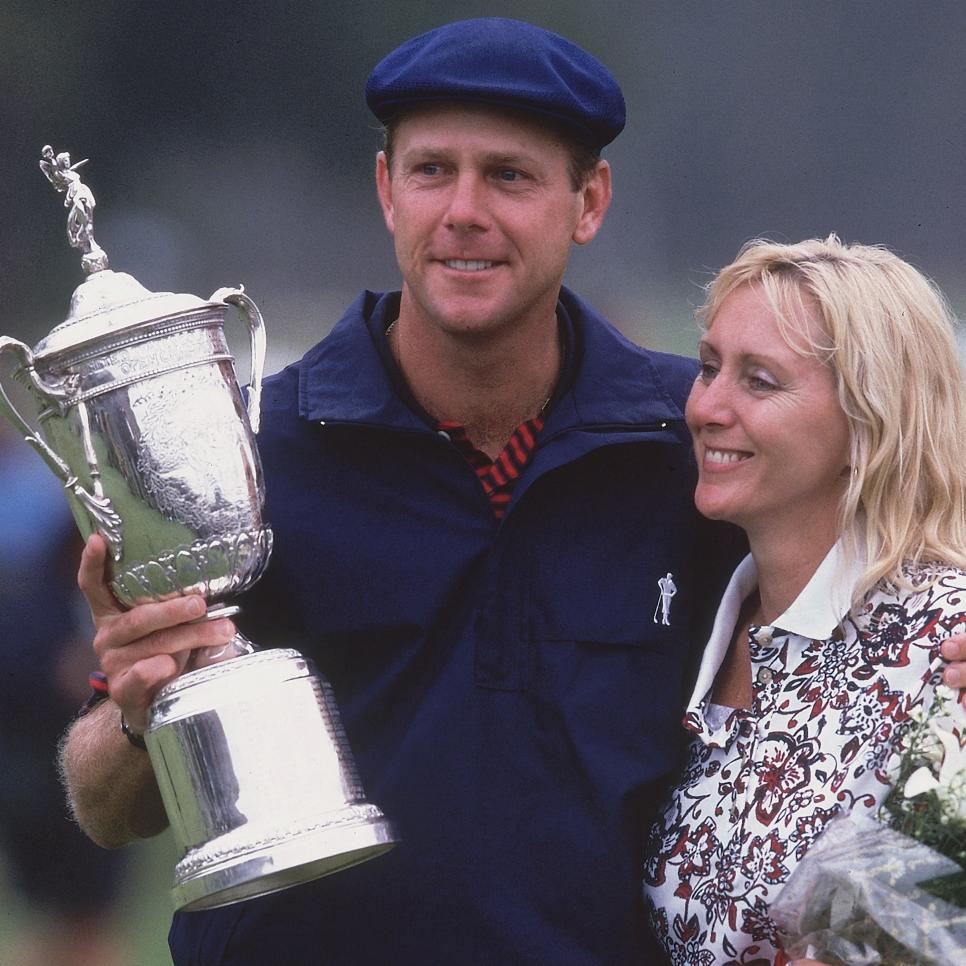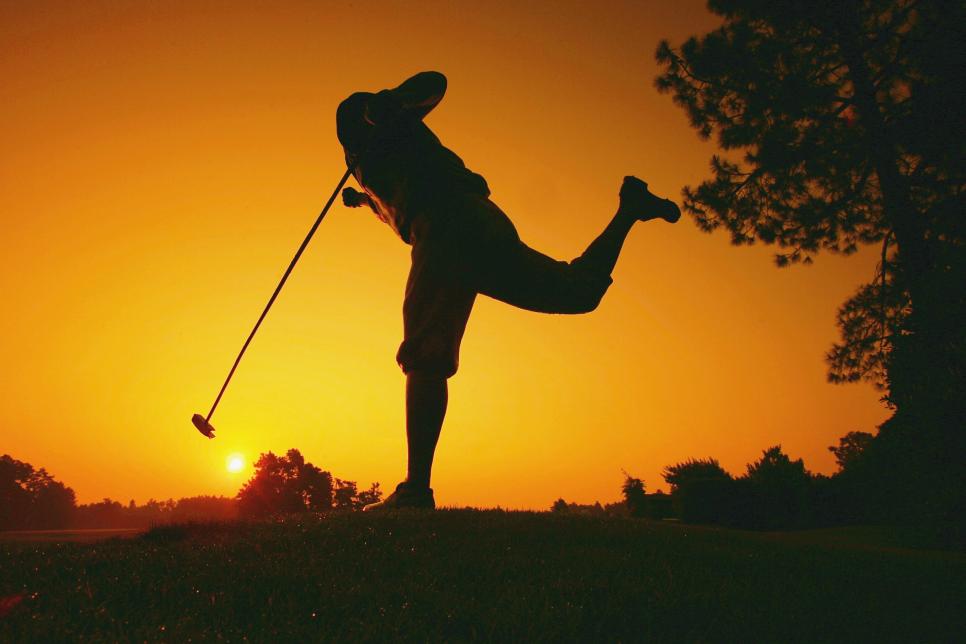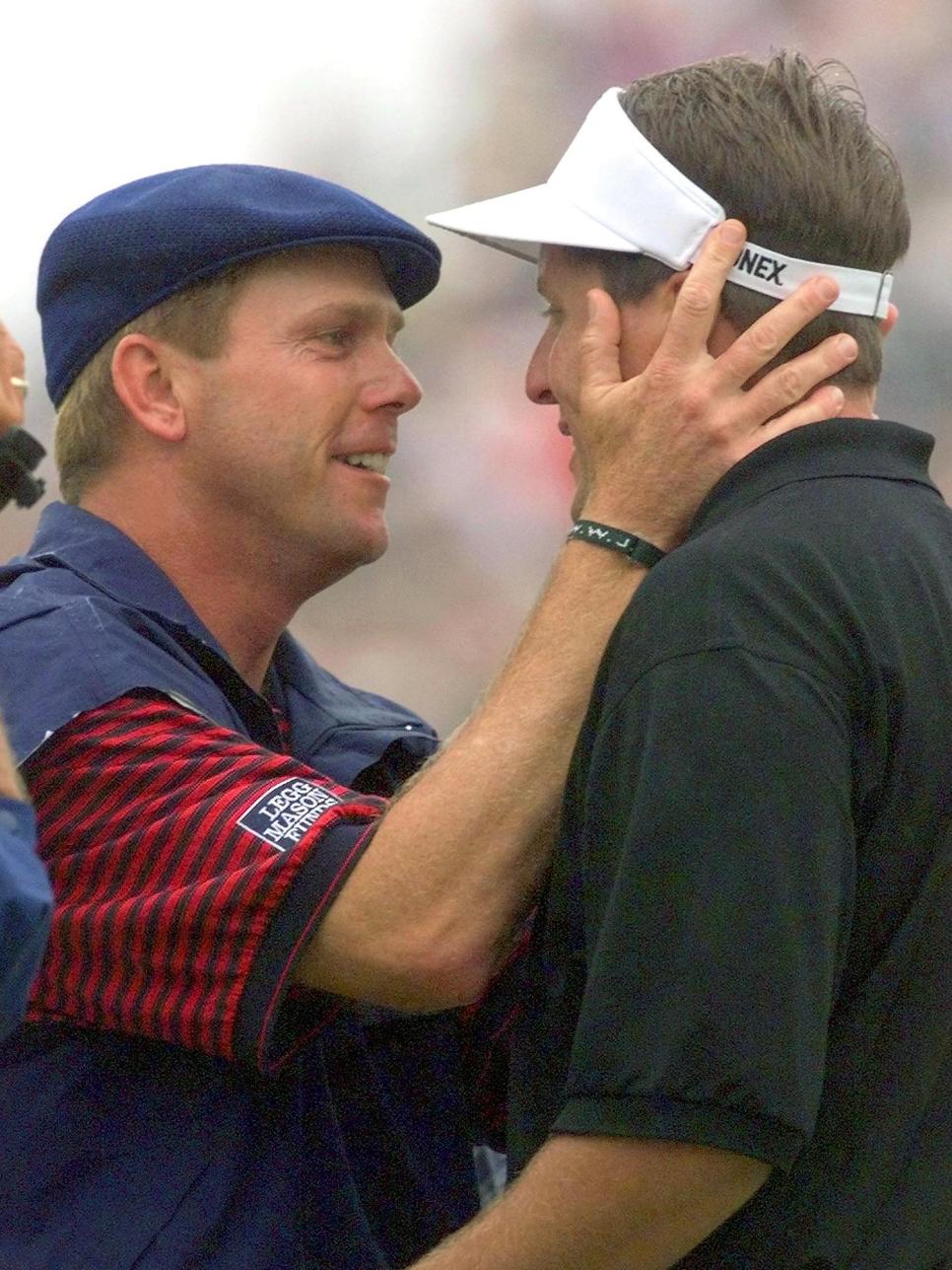PINEHURST, N.C. — It’s been 25 years, and Roger Maltbie, Dan Hicks, and lead producer Tommy Roy still work at NBC. They’re back at Pinehurst to call the 2024 U.S. Open, just as they did at the first Pinehurst Open in 1999. Joining them is Jim “Bones” Mackay, now an NBC analyst, who caddied for Phil Mickelson on that wild Sunday. The tournament remains etched in their memories, as Payne Stewart fought off a difficult course and a trio of formidable competitors in Mickelson, Tiger Woods and Vijay Singh to capture his second U.S. Open title. Stewart shook off the ghosts of his nightmarish ’98 U.S. Open at Olympic, when he lost a four-shot lead on Sunday. Stewart was a complicated figure, and his triumph at Pinehurst was made all the more poignant when he died just months later, at age 42, in a chartered plane flying from Florida to Dallas.
That year, Maltbie followed the final group; Hicks announced the early holes before coming to the 18th green to conduct the championship interview; Roy served as lead producer of NBC’s coverage; and Mackay carried Mickelson’s bag in the final group.
This is what they remember about that unforgettable Sunday.
Roy: When we get off the air on Saturday, we’re scrambling around here preparing for the next day, and usually everything’s done here in the truck. But in ’99, I had to go up to the clubhouse for a meeting about the closing ceremony the next day. I remember driving by the driving range, and there was Payne, Tiger, and Mickelson. And Tiger and Mickelson were just ripping these drives, and I stopped there and watched them for about five minutes, and there was a fence at the end, and they’re like ripping them into the fence, and Payne is doing his smooth swing, and kind of hitting pop flies. And I was thinking to myself, there’s absolutely no way the guy on the right can win this thing. No chance.
Hicks: I still think back to ’99 and to this day, it is the most personal one to me because of what Payne had been through, how he really became a different guy. I’d been covering him for years and years and years. And frankly, at times he could be very impatient, even surly, just trying to talk to him. So I think to fully understand it, you’ve got to go back to ’98. I was doing early holes at Olympic Club when he came up short and Lee Janzen won. He hit it in a sand-filled divot at the 12th hole, and then about the same time he got put on the clock. And I was thinking to myself, if there’s ever a time for Payne Stewart to lose his patience … but he handled it unbelievably well. He did a post-round interview with Roger Maltbie. Couldn’t have been nicer. I was like, wow, this guy’s a changed guy.
Maltbie: He was definitely a changed man. We were friends, and when I played we’d sometimes rent houses together. To give you an idea, his wife Tracy held my wife’s baby shower, and my wife held hers. But the earlier Payne … how do I say this without coming across callous? He was vain. He adopted the knickers and all that to be noticed. And he that reputation for being “Avis” too [a reference to the rental car company, and Stewart’s penchant for finishing second]. And he was a little self-centered. I still liked the guy a lot. He was a lot of fun. We both like Johnny Walker Red Label Scotch, and we’d have a couple of belts, and I’m sure we gave Donna and Tracy a few gray hairs. But the vanity, the self-centeredness, that all kind of went away. He found the Lord, and it became important in his life.
Hicks: I’ve spoken with Azinger, he thought that when he got sick with cancer, that really kind of shook Payne’s world. And Payne even talked about it. Tracy’s talked about it too. It had an effect on him realizing that, you know what? There’s so many other things so much more important in life than being a golf prodigy and growing up and winning major championships.
Stewart began Sunday with a one-under total, with Mickelson at even par, Woods at one over and Singh at two over.
Mackay: I’ll tell you a funny story about Sunday. There’s a guy named David Park who works for the European tour now; he played then, and on Sunday we woke up and had some time to kill. So we started watching the European Tour event, and he was playing well, and at a certain point we were already late leaving to get to the golf course, and Phil said, “No, I want to see if this guy wins the playoff.” So, you know, Phil was never really overwhelmed by any situation.
[Park lost that Moroccan Open playoff in six holes to Miguel Angel Martin.]
Mackay: To get from the range to the first tee in ’99, you had to cross in front of the 18th green, which means you had to cross in front of all these spectators. The stands were already full. The place went crazy. It just made the hair on my arm stand up just because everybody stood up and cheered knowing that in four hours, these guys would be coming down.
Hicks: Let’s not forget the rising star that Phil Mickelson was at this time. Or the baby beeper. The whole week, the talk swirling around was Phil and his first child and the baby beeper with Bones. (Mickelson’s wife Amy was expecting their first child that weekend, and Phil had vowed to leave the course if she went into labor. Ultimately, she gave birth on the day after the tournament ended.) To that point, it was really the overriding headline of the week.
Payne Stewart embraces runner-up Phil Mickelson after winning.
STEVE SCHAEFER
Mackay: You know the whole thing with the beeper and, yeah, he was of course talking to his wife about how she was feeling and where this was all going. He certainly would have left had the beeper gone off, but at that point he was bound and determined to win. He’d had an outside chance to win the U. S. Open at Shinnecock in ’96, so it wasn’t his first experience playing late at a U. S. Open, but he wanted to get the monkey off his back.
We already knew at that point what a relentless competitor Payne was. And we all were real familiar with what had gone on in ’98, where he drove in that divot on the back nine and lost to Janzen. So you just knew he was going to be tough. And he was out there to get the job done. So there was next to no conversation at all. It was an intense climate out there for both of those guys.
Roy: On Sunday, the weather was so bizarre when we got out here, it’s the middle of summertime and it’s chilly and misty. It’s like, what the heck is going on here? This is not Carolina weather or June weather. But we had to prepare for it, so everyone was scrambling, and then, right when we came on, all of a sudden Payne is cutting his sleeves off. We had video, and we thought, this is wild, what’s going on. Then they teed off and the thing that people don’t remember is Tiger was right there. And so, I’m kind of thinking that he was going to be the guy that would pull this thing off
Singh and Woods would both stick around for most of the day, but they would ultimately tie at one over, two shots back. Stewart extended his lead early with a birdie on the first hole, but Mickelson fought to under par, and when Stewart made bogey on 15, he fell to even and Mickelson had his first lead of the tournament. It was a two-man race going into the par-4 16th.
Maltbie: I couldn’t tell you a single shot that was played … until Payne made that putt for par at 16.
Mackay: What stays with me from that round is the putt Payne made on 16. They both hit it in the fairway, but the hole was playing incredibly long, given the fact it was the old golf ball. Phil hit 3-iron in there on his second. I want to say Payne, who went first, hit a 1-iron. But he pulled it, and the ball rimmed out, if you will, around a bunker short of the green. Came out in front of the green. It was a pretty darn good break. And then he mishit his chip. He hit it a little low on the club face a little bit thin and it ran past the hole 25 feet away.
Tiger had just missed a short putt and it seemed at that point it was now Phil and Payne only. And they always say, in a match-play situation, be prepared for your opponent to make everything. But that 25-footer that he made there for par on 16 was one of the most unexpectedly impressive putts I’ve ever seen anybody make in my career out here. It broke two ways, and it was a huge, huge moment.
Maltbie: I don’t know how he made the putt. I really don’t.
Mickelson made bogey at 16, and now the two were tied. At the par-3 17th, Stewart hit first and his 6-iron shot stopped at four feet. Mickelson hit a 7-iron to 10 feet.
Mackay: It was bedlam out there. I just remember taking a second to look around because the galleries were going crazy, and it was misting, and it was beautiful. It was like a movie set.
Maltbie: These are two very popular players, and it was coming down to the end and it was a two-man show. And at that point, you could cut the tension with a knife. It was a pretty electric kind of time. They both hit it in close and you thought, wow, anything could happen at this point. And you know, Phil blinked.
Mickelson missed his birdie putt, Stewart made his, and now Stewart had the lead by a shot going into 18.
Roy: On 18, the tee shot there from the players perspective, when you hit it, it goes over a hill and it disappears. Roger Maltbie called it, “Oh, that’s right down the middle. It’s going to be fine.” And it ended up in the rough because it disappeared over the hill. And we saw it, and thought, “Ooh, I don’t know if he can get it on the green from there.”
Maltbie: I got up there and took a look at the lie. It’s a pitch out. That’s all it is. And he pitched it up the fairway, like 78 yards or something to the hole.
Roy: So now it flipped back. Phil got on the green in two. Now he could make birdie. If Payne makes bogey, Phil wins it.

Payne Stewart hugs caddie Mike Hicks.
Bob Martin
Mickelson didn’t make birdie, but Stewart’s pitch onto the green left him a difficult 15-footer for par to secure the win. If he missed, there would be an 18-hole playoff on Monday.
Hicks: When the groups got through my holes, I hustled up to 18 to wait for this incredible finish and do the post-round championship interview and presentation. It was cool because it was the last year that I was actually doing that. It was like, if you were in Hollywood, this is how you would probably dial it up. You would throw on a little mist. You would hear, just before they got to the 18th green, the church bells from the Pinehurst church chiming. It just all had this unbelievable effect. And then he made the putt.
Mackay: The funny thing was, they have dots on the greens for the next day’s pin locations, right? You always see caddies looking out for the dots and I’m standing there and Payne’s got this 15-footer to break your heart and his caddie, Mike Hicks, came over to me, and he said, “Hey, have you gotten any of the dots for tomorrow?” And I was. like, that’s a crazy thing to say. Before the putt, he said that to me. And I was thinking to myself, damn, I haven’t gotten a single dot. And next thing I know, Mike’s jumping over into Payne’s arms and the other dots were irrelevant.
Maltbie: Tracy, his wife, didn’t come out early that day. She stayed in the house that they had rented there. And then all of a sudden, as I walked up toward the back left of the green, there’s Trace. And he makes the putt. It’s bedlam. Him and Hicksy are jumping up on each other; I think Hicksy straddled him or something like that, and I’m pretty sure I was the first person to hug Tracy. I remember there were tears in her eyes, tears in my eyes. I was so happy for him.

Payne Stewart and wife Tracy celebrate after his win.
Robert Beck
Hicks: I’ll never forget. I was five feet away from Tracy and Payne when they embraced in just the most heartfelt, powerful hug I’ve ever seen in sports. Tears are streaming down both of their faces, and I’m hearing Payne Stewart say, “I kept my head down. Just like you said, lovey, all day long.” And I’d come to know afterward, that’s what she told him before. When he said he was kind of struggling a little bit with his putting, she said, keep your head down.
Mackay: I will say, when we left, as much as it hurt, it was one of those times when you knew you were there for something special. I remember stopping at a Waffle House for dinner that night on the way back to Athens, Georgia, and listening to the conversations all around me, the people just going crazy about what had taken place. I took Phil to the airport after we left, and he just wanted to get out of there and get home to his wife. I feel bad for him that the U. S. Open thing never worked out, because while he definitely had a couple of last rounds where it didn’t go as well as he would have liked, he had two last rounds where he played fantastic golf, here and against (Retief) Goosen in ’04 at Shinnecock.
I tell people all the time—sometimes you win tournaments in the normal way, sometimes every now and then you’ll get something handed to you. And, on occasion, a player will go out of their way to win. Payne and Goosen in ’04 went out of their way to beat him. You’re caddying for a guy in the last group of the U.S. Open on a golf course as difficult as this, and he makes one bogey in 18 holes. And Payne went out of his way to beat him.
Hicks: My responsibility at that point was to get ready to do the post-round interview. And I’m thinking to myself, what in the heck do you ask a guy that just won on a putt like that after what he’d been through the year before, coming close? So I basically said, “You had a putt that everybody dreams about. Not only did you have that opportunity, but you made it.” And I remember the emotion was so high in his whole body that he just let out a whoop. The first thing, “whoo!” You see that repeat over and over. He didn’t even know what to say. He was just overcome.
Roy: I just think it was one of the greatest U.S. Opens we ever got to do.

The Payne Stewart statue at Pinehurst at sunrise.
David Cannon
Stewart made the Ryder Cup team that fall and was part of the epic comeback and the U.S. victory at Brookline Country Club.
Maltbie: At the Ryder Cup that year, after it was over, the locker room at the Country Club is a separate building. We went upstairs to this balcony where the guys were shaking the champagne and spraying it over everybody and drinking and hooping it up for the crowd down below. When I came downstairs, Payne was at a table in the little grill area there, and he said, Rodge, come on over. So over I went, I sat with him and Tracy, and he was just a different guy. We had a lovely conversation, and that was the last time I ever saw him.
Hicks: It was so tragic what happened. Oh God, how do you sum it up? You just look back and you think to yourself, there was a higher power at work here, in some mysterious way that maybe we’ll never understand. It was this crescendo to his life competitively and as a father and a husband and a friend that just … if God was going to take him away from us and his family, it was the most powerful message you could probably ever imagine. He just had his whole life in order, which at the same time made it so sad to lose a guy that had seemingly just figured it all out. It makes us look back at it with an even more powerful feeling.
MORE GOLF DIGEST U.S. OPEN COVERAGE
U.S. Open 101: Answering all your frequently asked questions How to watch the 2024 U.S. Open Power Rankings: Every player in the U.S. Open field, ranked The 13 best bets to win at Pinehurst Tee times for Rounds 1 and 2 ‘A New Day’: USGA president Fred Perpall brings dynamic personality and drive to golf Video: Every hole at Pinehurst No. 2 Is the USGA going to set up Pinehurst extra hard because of recent low scores in majors? Tiger is playing Pinehurst on a special exemption. Here’s what it is and why he got it What would you shoot at the U.S. Open? Our new tool will tell you U.S. Open anchor sites are about far more than golf The U.S. Open champion who died in a jail cell The USGA is about to play its 1,000th championship. The best 9 stats from the first 999
This article was originally published on golfdigest.com

